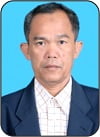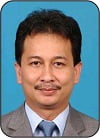Orientasi Kurikulum dan Konsepsi Pengajaran Fizik Berkesan dalam Kurikulum Tingkat Satuan Pendidikan
Abstract
RESUME: Kurikulum merupakan salah sebuah komponen yang sangat menentukan dalam satu sistem pendidikan, kerana kurikulum merupakan alat untuk mencapai matlamat pendidikan dan sebagai petunjuk perlaksanaan pengajaran dan pembelajaran pada semua peringkat pendidikan. Sistem pendidikan di Indonesia, dimulakan tahun 2006, telah menjalankan satu model kurikulum dengan apa yang dikenali sebagai KTSP (Kurikulum Tingkat Satuan Pendidikan). Kajian ini bertujuan untuk mengenalpasti orientasi kurikulum dan konsepsi pengajaran Fizik berasaskan pengalaman mengajar dan kelayakan akademik. Satu set soal selidik digunakan untuk mengumpulkan maklumat mengenai orientasi kurikulum dan konsepsi pengajaran dari sampel sebanyak 101 guru Fizik SMAN (Sekolah Menengah Atas Negeri) di Makassar, Sulawesi Selatan, Indonesia. Dapatan kajian yang diperoleh melalui min dan analisis ANOVA dengan menggunakan SPSS 17. Dapatan kajian menunjukkan bahawa tahap orientasi kurikulum daripada guru dengan pengalaman mengajar lebih 15 tahun diperolehi paling tinggi dan tahap konsepsi pengajaran pula diperolehi tinggi. Kajian ini juga mendapati bahwa wujud perbezaan yang signifikan antara tahap orientasi kurikulum pengajaran Fizik berasaskan pengalaman mengajar, tetapi tidak dengan kelayakan akademik; serta wujud pula perbezaan yang signifikan antara tahap konsepsi pengajaran Fizik berasaskan pengalaman mengajar, tetapi tidak dengan kelayakan akademik.
KATA KUNCI: Model kurikulum, subjek Fizik, guru sekolah menengah, pengalaman mengajar, kelayakan akademik, dan keberkesanan pendidikan.
ABSTRACT: “Curriculum Orientation and Conception of Effective Teaching the Physics in the School-Based Curriculum”. Curriculum is one of the crucial components in the education system, because the curriculum is a tool to achieve educational goals and as an indicator of teaching and learning at all levels of education. The education system in Indonesia, initiated in 2006, has carried out a model curriculum to what is known as KTSP (School-Based Curriculum). This study aims to identify the curriculum orientation and the teaching conception of Physics based on the teaching experience and academic qualifications. A questionnaire was used to collect information about the orientation of the curriculum and teaching conception of a sample of 101 teachers of Physics at SMAN (Public Senior High School) in Makassar, South Sulawesi, Indonesia. The results obtained by the mean and ANOVA analysis using SPSS 17. Findings showed that the curriculum orientation of teachers with teaching experience over 15 years is earned highest and the level of teaching conception also involved high. The study also found that there were significant differences between the orientation of Physics teaching curriculum based on teaching experience, but not with academic qualifications; and there was significant difference between the level of Physics teaching conception based on teaching experience, but not with academic qualifications.
KEY WORD: Model of curriculum, Physics, high school teacher, teaching experience, academic qualifications, and effectiveness of education.


About the Authors: Husain ialah Pelajar Program Doktoral di Fakulti Pendidikan UTM (Universiti Teknologi Malaysia), Skudai, Johor, Malaysia; dan Prof. Madya Dr. Abdul Rahim Hamdan ialah Pensyarah Kanan di Fakulti Pendidikan UTM, Skudai, Johor Malaysia. Bagi urusan sebarang akademik, penulis boleh dihubungi dengan alamat emel: husdisma22@gmail.com
How to cite this article? Husain & Abdul Rahim Hamdan. (2014). “Orientasi Kurikulum dan Konsepsi Pengajaran Fizik Berkesan dalam Kurikulum Tingkat Satuan Pendidikan” in SOSIOHUMANIKA: Jurnal Pendidikan Sains Sosial dan Kemanusiaan, Vol.7, No.1 [Mei], pp.79-88. Bandung, Indonesia: Minda Masagi Press owned by ASPENSI, UNHAS Makassar, and UNIPA Surabaya, ISSN 1979-0112.
Chronicle of article: Accepted (March 25, 2014); Revised (April 30, 2014); and Published (May 20, 2014).
Full Text:
PDFReferences
Abdul Gafar, Mohd Najib. (2009). Penyelidikan Pendidikan. Skudai, Johor: Penerbit UTM [Universiti Teknologi Malaysia].
Ary, D. et al. (2009). Introduction to Research in Education. Fort Wort: Holt, Rinehart, and Winston Inc.
BSNP [Badan Standard Nasional Pendidikan]. (2006a). Penyusunan KTSP Kabupaten/Kota: Panduan Penyusunan Kurikulum Tingkat Satuan Pendidikan Jenjang Pendidikan Dasar dan Menengah. Jakarta: Depdiknas RI [Departemen Pendidikan Nasional Republik Indonesia].
BSNP [Badan Standard Nasional Pendidikan]. (2006b). Standard Isi. Jakarta: Badan Standard Nasional Pendidikan.
BSNP [Badan Standard Nasional Pendidikan]. (2010). Laporan Hasil Ujian Nasional. Jakarta: Badan Standard Nasional Pendidikan.
Bybee, R.W. & I.D. Walch. (1972). “The Third Force: Humanistic Psychology and Science Education” dalam The Science Teacher, 39, ms.18-22.
Cameron, K.S., J.E. Dutton & R.E. Quinn. (2003). Positive Organizational Culture: Based on the Competing Values Framework. MA: Addison-Walley.
Champion, D.J. (1991). Basic Statistik for Social Research. CO: Macmillan Publishing, Inc.
Cheung, D. & H.W. Wong. (2000). “Measuring Teachers Meta-Orientations to Curriculum Application of Hierarchical Confirmatory Factor Analysis” dalam Journal of Experimental Education, 68(2), ms.225-248.
Cheung, D. & H.W. Wong. (2002). “Measuring Teachers Beliefs about Alternative Curriculum Designs” dalam The Curriculum Journal, 13(2), ms.225-248.
Chua, Y.P. (2009). Statistik Penyelidikan Lanjutan: Ujian Univariat dan Multivariate. Kuala Lumpur: Mc Graw Hill.
Creswell, J.W. (2008). Educational Research: Planning, Conducting, and Evaluating Quantitative and Qualitative Research. New York: Person Education Internasional.
Criswell, J.R. (1989). “Rethinking Micro-Computer Instruction as Part of Teacher Education Reform” dalam Educational Technology, 23(11), ms.40-43.
Cunningham, R., J. Johnson & S. Carlson. (1992). “Curriculum Orientations of Home Economic Teachers”. Paper presented at the American Vocational Association Convention, St. Louis, Missouri.
Disdik [Dinas Pendidikan] Kota Makassar. (2011). Hasil Ujian Nasional Mata Pelajaran Fisika. Makassar: Dinas Pendidikan Kota Makassar.
Dreyfus, A. (1987). “The Validation of Developers’ Assumptions about a Technology- Minded Biological Curriculum” dalam Research in Science & Technological Education, 5(2), ms.173-183.
Eisner, E. (1992). “Curriculum Ideologies” dalam P. Jackson [ed]. Handbook of Research on Curriculum. New York: Macmillan, ms.302-326.
Eisner, E. (2002). The Educational Imagination: On the Design and Evaluation of School Programs. Upper Saddle River, New Jersey: Marrill Prentice Hall, 3rd edition.
Eisner, E.W. & E. Vallance. (1971). Conflicting Conceptions of Curriculum. California: Stanford University.
Finley, F.N. (1983). “Science Process” dalam Journal of Research in Science Teaching, 20(1), ms.47-54.
Fraenkel, J.R. & N.E. Wallen. (1996). How to Design and Evaluate Research in Education. New York: McGraw-Hill Inc., 3th edition.
Gao, L. & L. Watkins. (2002). “Conceptions of Teaching Held by School Science Teachers in P.R. of China” dalam Journal Educational Science, 24(1), ms.61-79.
Gay, L.R. (2006). Educational Research: Competencies for Analysis and Aplications. New Jersy: Pearson Prentice Hall.
George, D.A. (1981). An Engineer’s View of Science Education. Ottawa: Science Council of Canada.
Gow, L. & D. Kember. (1993). “Conceptions of Teaching and Their Relation to Student Learning” dalam Bristish Journal of Educational Psychology, 63, ms.20-23.
Hattie, J. (2003). “Teachers Make a Difference What is the Research Evidence”. Tersedia [online] juga dalam www.docstoc.com/docs/2251792/Teachers-Make-a-Difference [diakses di Kota Makassar, Indonesia: 15 Januari 2014].
Idid, Syed Arabi. (1998). Kaedah Penyelidikan Komunikasi dan Sains Sosial. Kuala Lumpur: Penerbitan Dewan Bahasa dan Pustaka.
Jenkins, S.B. (2009). “Measuring Teacher Beliefs about Curriculum Orientations Using the Modified-Curriculum Orientations Inventory” dalam Curriculum Journal, 20(2), ms.103-120.
Kember, D. (1997). “A Reconceptualisation of the Research into University Academics Conceptions of Teaching” dalam Learning and Instruction, 7(3), ms.255-275.
Kember, D. & L. Gow. (1994). “Orientations to Teaching and Their Effect on the Quality of Student Learning” dalam Journal of Higher Education, 65(1), ms.58-74.
Klein, M.F. (1986). “Alternative Curriculum: Conceptions and Designs” dalam Theory into Practice, 21, ms.31-35.
Kerlinger, F.N. & E.J. Pedhazur. (1973). Multiple Regression in Behavioral Research. New York: Holt, Rinehart, and Winston, Inc.
Kerlinger, F.N. & H.B. Lee. (2000). Foundations of Behavioral Research. For Worth, Texas: Thompson Learning, 4th edition.
King, D. & J. Menke. (1992). “Providing the Instructors Note: An Effective Additional to Student Note Taking” dalam Educational Psychologist, 20, ms.33-39.
Land, M.L. (1987). “Vagueness and Clarity” dalam R. Dunkin [ed]. International Encyclopedia of Teaching and Teacher Education. New York: Pergamon.
Looney, L. (2003). “Understanding Teachers’ Efficacy Beliefs: The Role of Professional Community”. Unpublished Doctoral Dissertation. Maryland, USA: University of Maryland.
Majid Konting, Mohd. (2000). Kaedah Penyelidikan Pendidikan. Kuala Lumpur: Dewan Bahasa dan Pustaka.
Pratt, D.D. (1992). “Conceptions of Teaching” dalam Adult Education Quarterly, 42(4), ms.203-220.
Prosser, M., K. Trigweli & P. Taylor. (1994). “A Phenomenographic Study on Academic Conceptions of Science Learning and Teaching” dalam Learning and Instruction, 4, ms.217-231.
Rutherford, F.J. (1972). “A Humanistic Approach to Science Teaching” dalam NASSP Bulletin, 56, ms.53-62.
Slavin, R. (1987). “A Theory of School and Classroom Organization” dalam Eduational Psychologist, 22, ms.89-108.
Slavin, R. (1994). “A Theory of School and Classroom Organization” dalam R. Slavin [ed]. School and Classrooom Organization. Hillsdale, NJ: Erlbaun.
Sugiono. (2006). Metode Penelitian Kuantitatif, Kualitatif, dan R & D. Bandung: Penerbit Alfabeta.
Trigwell, K. & M. Prosser. (1991). “Improving the Quality of Student Learning: The Influence of Learning” dalam Higher Education, 22(3), ms.251-266.
Trigwell, K., M. Prosser & F. Waterhouse. (1999). “Relation between Teacher’ Approaches to Teaching and Student’ Approaches to Learning” dalam Higher Education, 37(1), ms.57-70.
Tucman, B.W. (1998). Conducting Educational Research. New York: Harcourt Brace Jovanovich, Inc.
Tyler, R. (1950). Basic Principles of Curriculum and Instruction. Chicago: University of Chicago.
SOSIOHUMANIKA: Jurnal Pendidikan Sains Sosial dan Kemanusiaan is published by Minda Masagi Press. This work is licensed under a Creative Commons Attribution-Sharealike 4.0.
